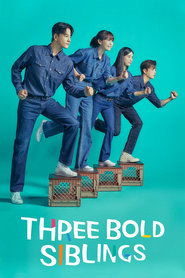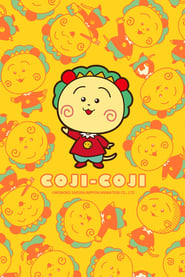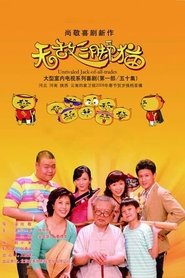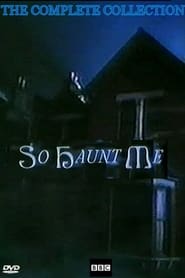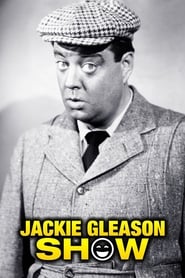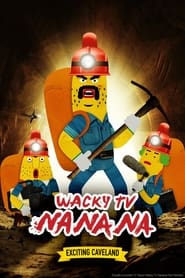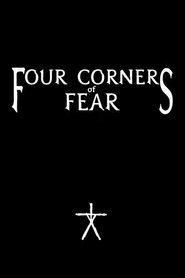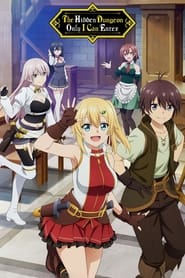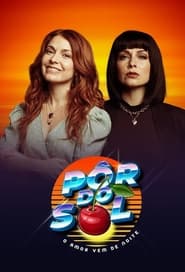Best Comedy TV Series - Page 362
-
Dara O Briain's Go 8 Bit
2016
star 6.2Gaming enthusiast Dara O Briain presides over the mayhem as two stars join team captains – gaming geek Steve McNeil and gaming cynic Sam Pamphilon – to battle each other at their favourite computer games. -
Show by Rock!! Stars!!
2021
star 10"All stars" season of Show by Rock!! featuring all the bands from previous seasons. -
Three Bold Siblings
2022
star 5The K-eldest-son and K-eldest-daughter meet while sacrificing themselves in search of happiness and love. -
Downstairs
2019
Downstairs
2019
Downstairs is an adult animated series that follows a cast of wacky and colourful Kopitiam stalls owners on the ground floor of an unnumbered HDB flat, in an unnamed HDB estate. Together, everyone seems to bring out the very best and worst in each other as they embark on crazy adventures throughout their little neighborhood. -
Dakishimetai!
1988
Dakishimetai!
1988
Asako Ikeuchi and Natsuko Hayakawa have been close friends for more than 25 years. Natsuko's husband Keisuke had affairs, so she asks Asako to let her stay at her house. Keisuke was once Asako's boyfriend. They will soon be 30 years old. There are other nice guys around Asako. It's a drama about their love and friendship. -
TNT
2023
TNT
2023
TNT, a Nowruz special program hosting Hamed Ahangi, presents a demanding competition to the audience on new year's eve. Different and thrilling parts of this program include live music, conversation and interesting tasks with artists, singers and athletes such as Javad Yasari, Omid Hajili, Masoud Sadeghloo, Alireza Biranvand, Abbas Jamshidifar, Yousef Teymouri, etc, guesting on the show -
Coji-Coji
1997
star 6They are neither animals nor humans. They cannot be distinctly categorised as boys or girls. They are also not considered to be Earthlings or space creatures. There are no such specific titles in the world of Coji-Coji. Instead, it boils down to the meaning of "existence", an emphasis on the root of a character. This world hinges on all things natural, the pure existence of life. The protagonist, Coji-Coji, represents a perfect existence where truths of life are constantly being delivered and no words of malice can be spoken. -
Yozakura Quartet
2008
star 6.7In Sakurashin, humans and demons live side by side in peace. But when a series of strange events threatens the delicate balance of their town, it will be up to four superpowered teens to restore order and save the day! -
无敌三脚猫
2009
无敌三脚猫
2009
-
So Haunt Me
1992
star 6.8So Haunt Me is a British television sitcom about a family that moves into a home occupied by the ghost of its previous resident, a middle-aged Jewish mother. The show was produced by Cinema Verity for the BBC and originally aired from 1992 to 1994. Peter Rokeby loses his job as advertising copywriter, and resolves to become a freelance writer. Owing to this change in circumstances, he and his wife Sally move with their children into a more modest home in Meadow Road, Willesden. The family soon finds that the ghost of a previous owner, Yetta Feldman, still occupies the residence, and has been scaring occupants away for years. Yetta is a stereotypical interfering, middle-aged Jewish mother who died suddenly after choking on a chicken bone. While Sally can both see and speak to their ghost, Peter — much to his frustration — initially cannot. The family agrees to help Yetta find her grown-up daughter Carole. So Haunt Me aired on BBC1 as 18 half-hour episodes in three series and one special from 1992 to 19 -
Please Classmate
2021
star 4The story tells of two groups of youths who are at odds with one another, who must work together to merge the two factions together. Chaos arises when the leader of the Northern faction Ming Ze Yu, and the leader of the Southern faction Yi Zheng He become classmates in the same class. -
The Jackie Gleason Show
1966
star 8.2The prodigiously talented Gleason became a TV icon after he joined CBS from DuMont, where his work on `Calvalcade of Stars' had established many of his trademark characters, including Reginald Van Gleason III, the Poor Soul and Ralph Kramden, featured here, along with Art Carney, in `Honeymooners' sketches. The Emmy-winning mix also featured guest stars, musical comedy, the glitzy June Taylor Dancers and Frank Fontaine's Crazy Guggenheim character. -
Doomsday with My Dog
2022
Doomsday with My Dog
2022
The sole surviving human and her canine companion, Haru, wander a desolate wasteland after the destruction of civilization, but this is no dark doomsday tale. Haru, a wise-beyond-his-years talking shiba inu, makes sure his master stays one step ahead of post-apocalyptic pessimism with his clever antics, hilarious observations and philosophical ponderings. She may be the last girl on earth, but with Haru at her side, the road through the apocalypse will never be boring! -
Wacky TV Na Na Na
2018
star 2An adult comedy series about a film crew of banana men who work for a television station. In order to boost ratings they have to follow the absurd requests of the boss. -
Life & Beth
2022
star 6.4A trip down memory lane is a strong source of trauma, comedy and moving forward. -
Dolce Vita & Co
2001
-
Four Corners of Fear
2013
Four Corners of Fear
2013
The cast and crew of "The Blair Witch Project" attempt to produce a belated follow-up with the involvement of a Hollywood superstar. -
The Hidden Dungeon Only I Can Enter
2021
star 8The Hidden Dungeon is a place of legend where rare treasures and items are hidden. Nor, the third son of an impoverished noble family who's lost the one job offer he had, was lucky enough to hear about this dungeon. He then acquires a skill that allows him to create, bestow, and edit skills... and in order to use it, he needs to accumulate points by carrying out such tasks as eating delicious meals and doing sexual things with alluring members of the opposite sex. -
Pôr do Sol
2021
star 8.6Love, passion, mystery, betrayal makes the days of the Pôr do Sol estate. The Bourbon de Linhaça family owns the Pôr do Sol estate, but not everything is rosy... -
From Now On, Showtime!
2022
star 7.6In addition to the romance between Cha Cha-woong, a magician and employer who handles and manages ghosts, and a passionate female police officer with occult powers, the characters will have to solve a case they coincidentally get swept up in by cooperating with ghosts to uncover clues.


